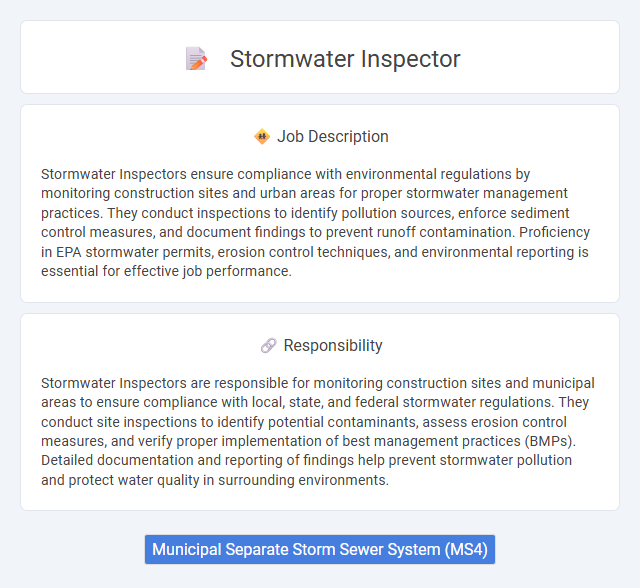
Stormwater Inspectors ensure compliance with environmental regulations by monitoring construction sites and urban areas for proper stormwater management practices. They conduct inspections to identify pollution sources, enforce sediment control measures, and document findings to prevent runoff contamination. Proficiency in EPA stormwater permits, erosion control techniques, and environmental reporting is essential for effective job performance.
Individuals with strong attention to detail and a commitment to environmental safety are likely suitable for a Stormwater Inspector role. Those who can handle fieldwork and navigate varied outdoor conditions may find the job a good fit. Candidates with limited physical stamina or low interest in regulatory compliance might be less suitable for this position.
Qualification
A Stormwater Inspector must possess a strong understanding of environmental regulations, including the Clean Water Act and local stormwater management ordinances. Proficiency in conducting site assessments, identifying potential sources of pollution, and using specialized inspection tools and software is essential. Candidates typically require a background in environmental science, civil engineering, or a related field, along with certifications such as Certified Stormwater Inspector (CSI) or equivalent.
Responsibility
Stormwater Inspectors are responsible for monitoring construction sites and municipal areas to ensure compliance with local, state, and federal stormwater regulations. They conduct site inspections to identify potential contaminants, assess erosion control measures, and verify proper implementation of best management practices (BMPs). Detailed documentation and reporting of findings help prevent stormwater pollution and protect water quality in surrounding environments.
Benefit
Stormwater Inspector roles likely offer the benefit of contributing to environmental protection by ensuring compliance with regulations that prevent water pollution. The position may provide opportunities for professional growth in environmental science and regulatory fields. Candidates might also gain valuable experience working with government agencies and community stakeholders to promote sustainable water management practices.
Challenge
Stormwater inspectors likely face the challenge of balancing thorough regulatory compliance checks with the unpredictable nature of weather conditions, which can complicate timely site assessments. They may also encounter difficulties interpreting complex environmental regulations while coordinating with multiple stakeholders, increasing the risk of oversight. Managing the volume of inspections required to effectively reduce pollution and prevent flooding probably demands strong organizational and problem-solving skills.
Career Advancement
Stormwater Inspector roles offer significant career advancement opportunities through gaining expertise in environmental regulations, water quality monitoring, and compliance enforcement. Professionals can progress to senior inspection positions, environmental compliance management, or roles in urban planning and civil engineering projects focused on sustainable stormwater management. Continuous certification and specialized training in state and federal stormwater regulations further enhance promotion prospects in this growing sector.
Key Terms
Municipal Separate Storm Sewer System (MS4)
Stormwater Inspectors specializing in Municipal Separate Storm Sewer System (MS4) ensure compliance with federal and state regulations by conducting thorough inspections of stormwater infrastructure to prevent pollution and manage runoff effectively. They evaluate stormwater discharges, identify illicit connections, and oversee maintenance of detention basins and conveyance systems to protect local waterways. Expertise in MS4 permit requirements and Best Management Practices (BMPs) is essential to support municipal stormwater management programs and promote environmental sustainability.
 kuljobs.com
kuljobs.com